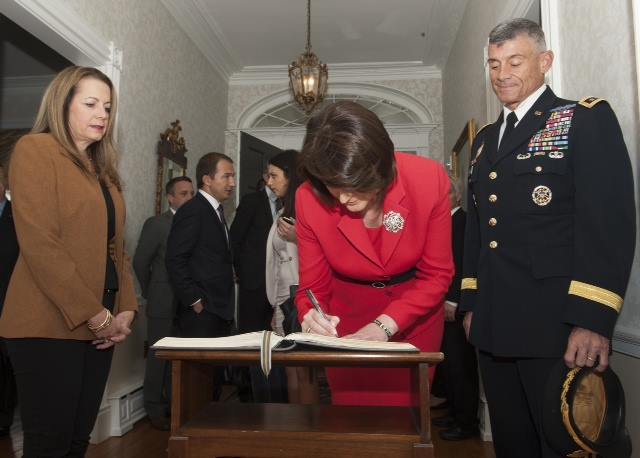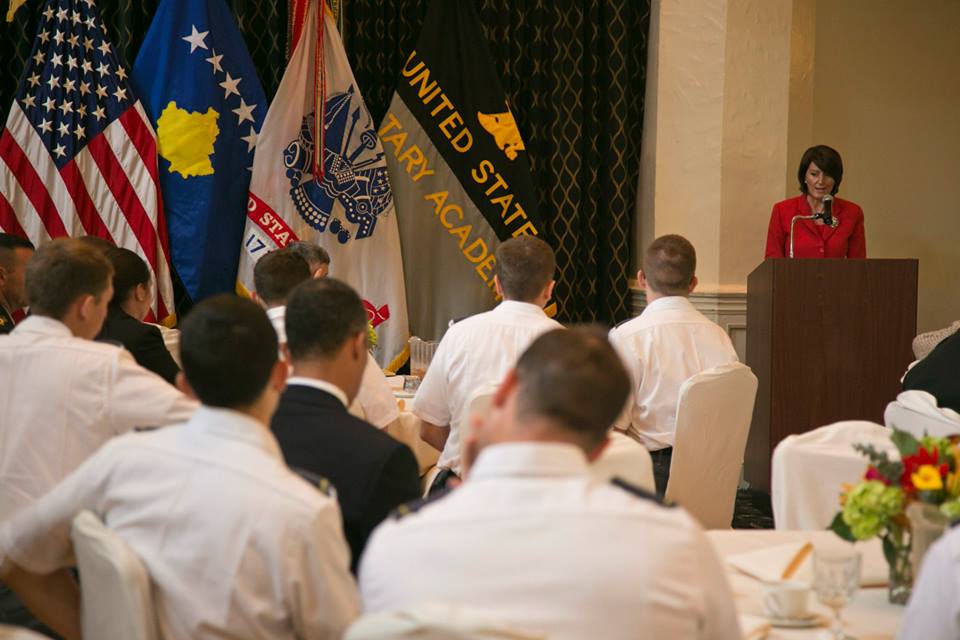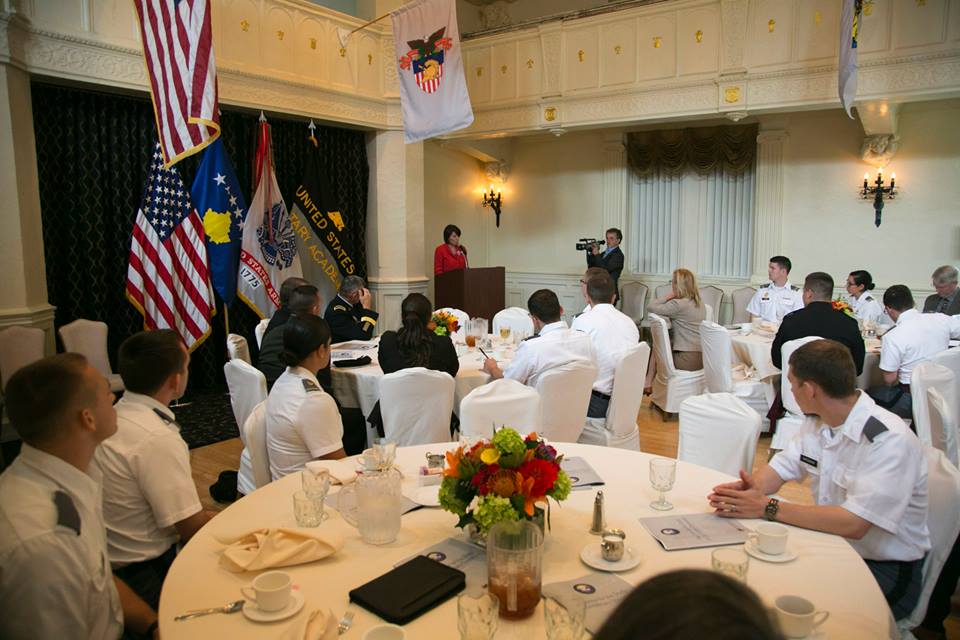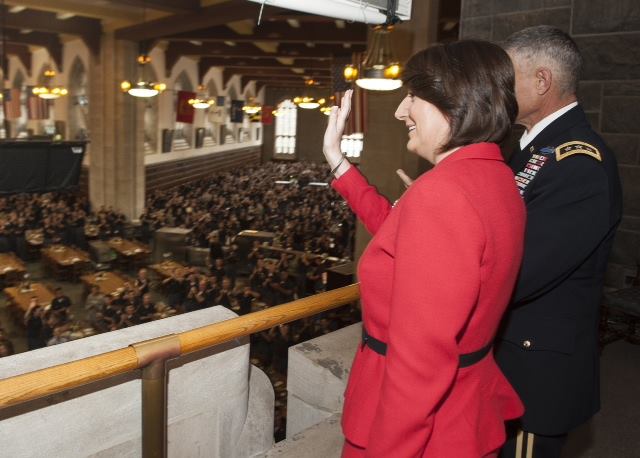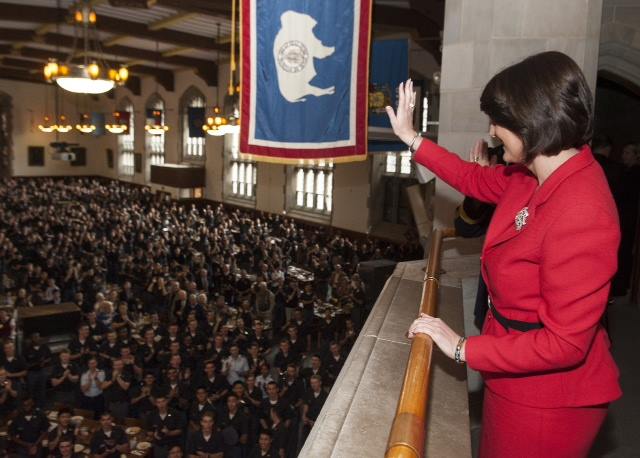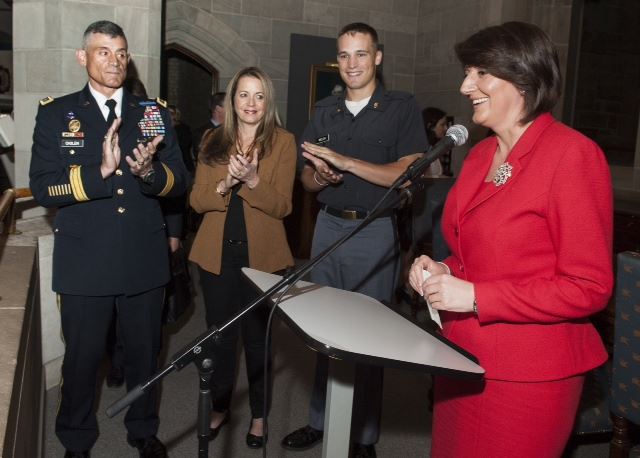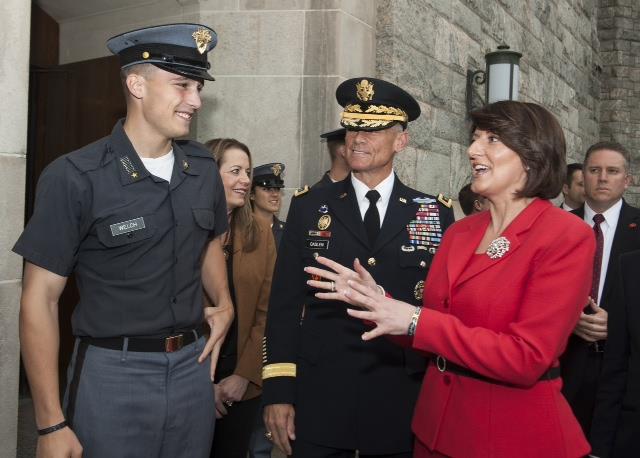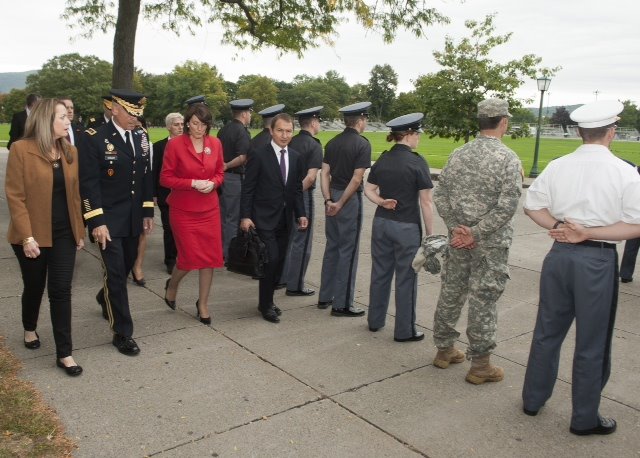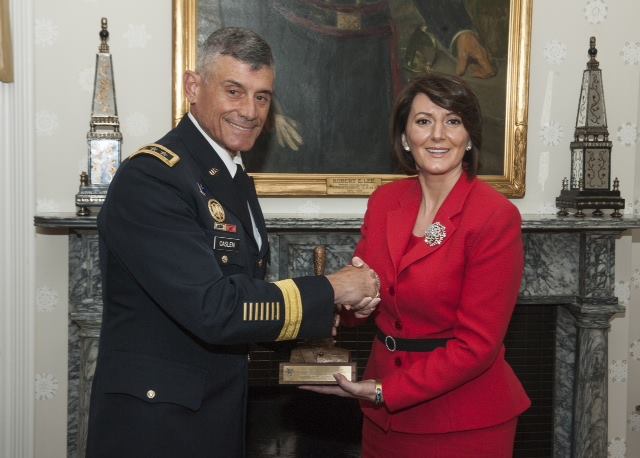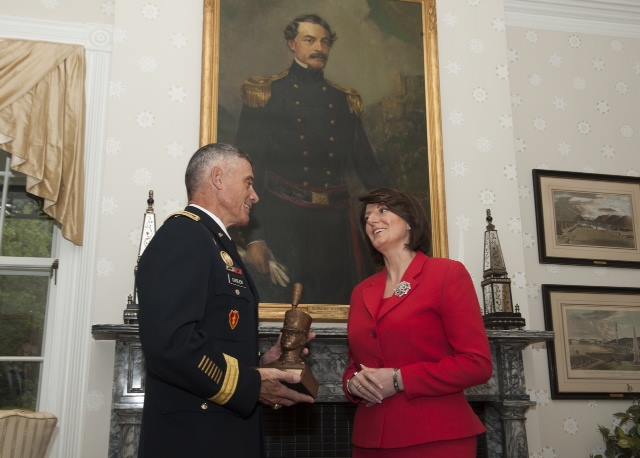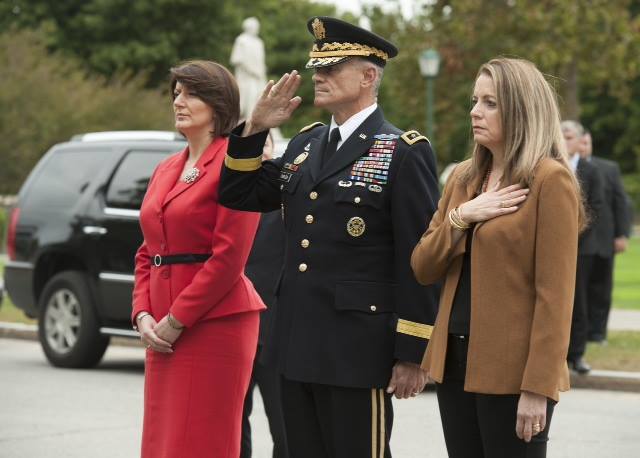President of the Republic of Kosovo, Mrs. Atifete Jahjaga, delivered a speech at the West Point Conference on Conflict Transformation.
A special reception was organized for President Jahjaga. She was received by the National Guard and the ceremony was followed by the 21 gun salute.
Following is Madam President’s address in full:
Distinguished guests,
Dear friends,
Ladies and Gentlemen,
It is a great pleasure to be here at West Point with you today, at this great American institution, to discuss lessons learned from the Kosovo war and the peacemaking efforts that took hold ever since the end of the war, which have enabled us to build a viable and democratic country.
I stand before you as someone whose past was shaped by the conflicts seen repeatedly in the 20th century, the very last of which, in 1999, touched me, my family, our country—directly, and for many tragically.
It was a conflict that never needed to happen. It never should have happened. But it did happen, because of a dictator who had the power to seed distrust and create fear. He was wrong. And he was defeated.
We are left to rebuild, to develop, to remember, and to not repeat the mistakes of the past.
Both these two periods – the war and the aftermath – in Kosovo’s recent history have been difficult. Overcoming them took perseverance and commitment from everyone — the Kosovo citizens, who had suffered immensely under the Serbian regime, who mobilized first in a Gandhi-style civil resistance to challenge the apartheid in the 1990s, and later in mobilizing support for the Kosovo Liberation Army, that fought for Kosovo’s independence. Who were targets of the inhumane, indiscriminate violence that Serb forces unleashed on them.
The international community, especially the US led coalition and the NATO countries, which united in their promise to stand up and prevent genocide to took place again in Europe and were faced with the demanding task of committing troops and efforts, and at times domestic criticism over involvement in a corner of the world that seemed too distant.
The tasks at hand for this side of the conflict was first to win the war and give Kosovo a chance to live in freedom, and then to build peace and to allow Kosovo to mature politically in a way that would make any future conflict obsolete.
Let me briefly revisit this period in Kosovo.
In 1998 and 1999, the Serbian repression reached its peak in Kosovo, as the daily killings of civilians became a norm and a campaign of ethnic cleansing emptied out Kosovo – in less than two months, nearly one million refugees were pushed out of the country, an effort by Serbia to also destabilize Macedonia and Albania. Inside Kosovo, in a crusade of killings, Serbian forces in door-to-door operations rounded up Albanian men of all ages to summarily execute them. Families were separated. Many women were raped in an effort to not only dehumanize them but to use this horrendous crime as a tool of war.
It was a horrific picture. One that the world that was embarking on the 21st century with hope of embrace of democratic values was not permitted to tolerate. Innocent civilians were being slaughtered. Little did it matter what the end game was. But use of force for the purpose of ending this incredible suffering became unavoidable.
Under US leadership, NATO acted with a decision to bomb Serbian military and police targets. After 78 days of bombing, the humanitarian intervention to end this episode of the wars in the Balkans was completed successfully. Serbian forces withdrew from Kosovo, and Kosovo became a United Nations protectorate.
Countries around the world committed ground troops to keep the hard won peace in Kosovo and to create the ripe conditions to guide Kosovo toward building its normalcy and democracy.
Refugees came back to their homes to find they were turned into rubble.
There were tears, there was anger. And in the ensuing chaotic aftermath of the security vacuum there was revenge by mobs against the Serbian minority, forcing them to flee, destroying their property.
Rebuilding the physical damage and the emotional wreckage that the war had caused took time and patience. Amid competing priorities, and our strong push for independence, we had to lay a sound foundation of democratic institutions, of a free market economy. We, together with our international partners had to transition Kosovo from war to peace, from authoritarianism to democracy, from state-controlled economy to capitalism. All this in a climate of a political limbo, where Kosovo was neither a state, as its Albanian majority demanded, nor a province as Serbia claimed.
So the question is, how did we do it? And what did we learn in this process?
The first answer is to build democracy – through open societies that share information. When there is information, there is enlightenment. When there is debate, there are solutions. When there is no sharing of power, no rule of law, no accountability, there is abuse, corruption, subjugation, and indignation. Where there is no democracy, there is dictatorship. And when there is dictatorship, there is conflict—especially in our globalized, wired age. We have seen this not only in Kosovo, but also in Egypt and Syria—dictators preside over a false stability that will give way to people’s undeniable desire and right to be free.
When it comes, democracy is a revelation. It’s also complex. There are elections to hold, politics to create, rights to assert, grievances to settle and institutions to build. Often for the first time, people may speak openly and genuinely. To many it’s exhilarating. For others it can be disappointing, when it turns out that democracy doesn’t immediately make life better.
We must remember that democracy works when given time to develop, mature, and deliver, democracy is always in the making.
Government institutions must treat citizens fairly, with dignity, while servicing their needs. Societies must develop not only the confidence to seize freedom, but to act upon it with charity and wisdom. Then democracy works. This is what you know, and this is what I and the people of Kosovo affirm as we moved through our first years as a free and democratic society, learning, adapting, and achieving.
The process of democratization in Kosovo had enormous challenges. The phase of emergency, period of rebuilding and the overall revival was concurrent with efforts to democratize the country. I am proud we have managed to build pluralism and encourage the participation of all Kosovo communities.
As part of the process of building the foundation of our democractic state, we reached out to find the best international practices and to implement them according to Kosovo’s needs. And in reaching out to other citizens of the world, we discovered that what our citizens want is not much different from what all others want in the rest of the world: to hold their leaders accountable, to seek better governance. And for goverment to serve the people rather than people serve the government. And we are exerting our full strengh to meet their expectations.
It is with the same determination that we are trying to mend the differences and remedy the shaken trust which still lingers due to the legacy of the war especially between the Albanian majority and the Serbian minority. And there has been success as Albanian-dominated institutions have extended legal guarantees for the protection of the rights of the Serbian community as well as their way of life and religious tradition in Kosovo. As a result, the Serbian community in most of Kosovo is fully integrated in the institutional life and in running the day-to-day business in the municipalities where it resides.
Host-country governments like Kosovo are both partners and beneficiaries of assistance providers. But international community must recognize that development is a balance between the short-term and long-term. It also needs to learn when it is time to end an engagement as well as when to step in because when international assistance goes on for too long or becomes too pervasive, a well-meant intervention can become counterproductive.
At times this dual role of being a partner and a beneficiary can confuse expectations about what governments are supposed to accomplish and, how they can deliver. Go too slow in transferring development responsibilities to local institutions and they can become too reliant. Go too fast and countries may become unstable. Acknowledging this duality is an important element to maximizing development strategies because if a country remains dependent on others to tackle its main priorities it may never develop the ability to do so for itself.
We need to recognize that over time governments, and indeed the private sector and civil society, should assume full responsibility for the development of their countries.
Kosovo’s own development was remarkable, but this economic and political dependency has at times slowed down Kosovo’s state-building process and consolidation of the country’s political class. Kosovo’s development, however, is a joint success story although the engagement and the role of the local forces should have been more powerful and direct in all the phases of Kosovo’s consolidation.
This fragility has impacted the further development of Kosovo in the area of politics, economics and security as development and security are tightly linked. Security determines the development of a country. Kosovo had a strong correalation between domestic and international mechanisms of security. NATO’s peacekeeping force, deployed in Kosovo since the end of the war, often has played the role not only of the guardian of Kosovo’s borders with its neighboring countries, but it also helped the communities in Kosovo to facilitate their lives and rebuild the ties between them.
Which brings me to my third answer, to security and inclusion. Societies across the world are rapidly changing as new ways of thinking, new forms of self-expression, evolve. People historically placed on the sidelines by social convention and personal prejudice — concerning gender, race, youth, sexual orientation, and disability–are stepping forward to take their place at the table.
We must make room, for we are all enriched by their inclusion, which breeds security. Security is the foundation of the state-building process. Security means economic development and investments. And security guarantees the construction of a strong and respected society.
For many years, in my country, the uniform symbolized violence and brutality. But, in the last decade Kosovo has become a country in which its citizens perceive the police force as their own, a force that looks after their security and rule of law regardless of which ethnic community they are serving.
I was part of building this force and I am a strong believer that the security of an individual and the security of a community means the security of a whole country.
I strongly believe that security forces need to build relations with the community and help the country’s development, prosperity and democratization.
Kosovo police and Kosovo’s Security Force have succeeded in this, overcoming a legacy of mistrust that was bred due to a long record of repression by security forces. And this, I want to emphasis again, was only possible because of the foundation that the military forces, the peacekeepers under the NATO umbrella laid, your military leaders, some of them who passed through this institution that carries so much history, have shown us how you carefully build these relations.
By offering the broad security to the citizens of Kosovo, they allowed them to live and prosper. To rebuild without the fear that their property will again be destroyed.
To the question then, of what are the lessons learned, I say we need to improve people’s lives by strengthening societies, and reduce conflict, I say democracy, development, security and inclusion.
We succeeded jointly in Kosovo because we build a vision based on values. We did not make predictions about the future or calculated the risks. We were led by the belief that we must act together to save the lives of our citizens, to fight for our common humanity. We build a viable vision, in which the international community and international peacekeepers stepped in to allow Kosovo to grow and mature. And step by step, new institutions were created by Kosovo for Kosovo to take up the security and political responsibility for our country.
And what we built together is bound to last.
Dear friends,
We are witnesses to a more complicated world, rife with conflict and human suffering. In this new environment it matters little where we are geographically located or what the sizes of our countries are. We are all endangered by the same threats to our democracy and to our citizens.
There is no better example of this than the current threat we all face from groups and individuals who want to challenge our values. And in the face of such threat we should stand united to protect what is fundamental to our societies – freedom and their security that will determine the chances of our prosperity. This is one compromise that we should never make.
Thank you!

